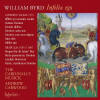Texte paru dans: / Appeared in:

Fanfare Magazine: 33:6 (07-08/2010)
Pour
s'abonner / Subscription information
Les abonnés à Fanfare Magazine ont accès aux archives du
magazine sur internet.
Subscribers to Fanfare Magazine have access to the archives of the magazine
on the net.
Hyperion
CDA67779

Code-barres / Barcode:
0034571177793 (ID26)
Consultez toutes les évaluations recensées pour ce cd
~~~~ Reach all the evaluations located for this CD
Over a span of 13 years Andrew Carwood has recorded the complete Latin church music of William Byrd on 13 CDs, the last four on this label, continuing a series begun on ASV Gaudeamus. I may have referred to the series in the past as the complete works, which is hardly correct, but it is certainly the largest body of Byrd’s music to be recorded in a series. Except for one day’s worth at the end of the Gaudeamus period, all the sessions took place in Fitzalan chapel of Arundel Castle, for 850 years the estate of the Duke of Norfolk, the leading Catholic nobleman during penal times. (A Web search turns up sites that are both beautiful and informative.) This disc completes both the Gradualia (here the feast of All Saints) and the Cantiones Sacrae of 1591, the latter set continuing from two earlier discs. The outstanding motet here, which gives the disc its title, is “Infelix ego,” a text by Savonarola previously set by Willaert, Rore, and Lassus. But Carwood opines that “none of these comes even close to this emotional tour de force.” Since he ranks it as “the crowning glory of Byrd’s achievement as a composer of spiritual words and one of the greatest artistic statements of the 16th century,” he places the piece at the end of his final disc. This masterpiece has not been recorded lately, the versions by Peter Phillips (the first ever), Jeremy Summerly, and Andrew Mackay all dating back many years. Carwood brings a special interpretive power to this performance, using paired voices on the six parts as the other three did.
The other 10 works from the 1591 book include only four that were recorded by Edward Higginbottom (Fanfare 10:6) in the only sizable collection of music from this book. The rest of the group must include some pieces seldom if ever recorded before. The Propers for All Saints Day from the Gradualia were heard most memorably along with two versions of the Mass for Five Voices, one by Stephen Darlington, the other by Harry Christophers (both reviewed together in 14:2). Inserted in the middle of the program, the four pieces provide a contrast to the earlier works. Altogether, the 13 discs have been laid out in a sensible fashion, systematic enough without putting each group of pieces on separate discs. This is especially beneficial for the brief but intense pieces of the Gradualia, which can be heard in small doses on all but two of the discs. Now that the set is complete, future recordings of Byrd’s Latin church music will be measured against it. Start with this or any disc, then go on to the others.
Cliquez l'un ou l'autre
bouton pour découvrir bien d'autres critiques de CD
Click either button for many other reviews


